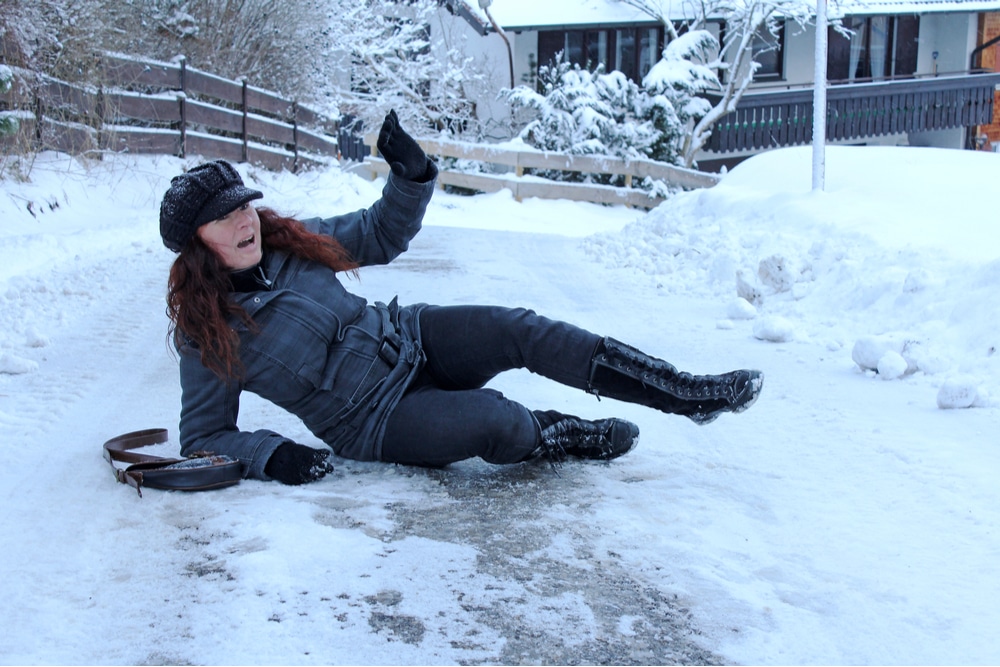Slip and fall accidents are common, especially in inclement weather. Everyone can recall a time that they slipped on a slick surface, tripped, or perhaps even fell. Fortunately, most of the slip and fall accidents are relatively minor, and those involved don’t suffer from serious injuries.
In many cases, however, slip and fall accidents can be serious – a victim falls on an especially hard surface or at a dangerous angle, or perhaps falls from a great height or lands on something and is injured.
These accidents are sometimes the fault of dangerous conditions. At Claim Your Justice, our experienced slip and fall attorneys in Schaumburg, IL can help you if you’ve been injured because of a slip and fall accident. To learn more about how we can serve you, call our law firm directly today or send us a message at your convenience.
Property Owner’s Duty of Care and Slip and Fall Accidents
When a slip and fall occurs and someone else is to blame, the victim has the right to bring a personal injury claim for damages. Typically, this claim is brought against the property owner where the accident occurred. However, merely slipping and falling on someone’s property doesn’t mean that the property owner will be liable; instead, a slip and fall victim will need to prove that the property owner breached the duty of care owed to the person.
The duty of care of a property owner is to maintain a property in a safe condition and to correct any known hazards within a reasonable amount of time. If this duty is breached and someone is injured as a result, the property owner can be held liable for their damages (assuming that the victim was on the property lawfully).
Common causes of slip and falls that are the result of a property owner’s failure to maintain a property in a reasonably safe condition include:
- Broken stairs
- Broken elevators and escalators
- Debris in walkways
- Lack of handrails or defective handrails
- Falling objects
- Spills of food, drink, or other substances
- Torn carpet
- Depressions or holes in walking areas
- Many others
What Does a “Reasonable” Amount of Time Mean?
Property owners aren’t expected to be in a position where hazards never exist on the property; after all, spills and other types of accidents and damages happen. But they are expected to repair any known hazards (or hazards that should have been known) within a reasonable amount of time.
What is “reasonable” can vary from situation to situation. For example, if an elevator is broken, it’s probably reasonable for a property owner to put up a sign warning of the hazard of using the elevator nearly immediately upon learning of the problem, but it may be a few days before a property owner is able to get a repair person to come out. On the other hand, if there is a spill in the grocery store, there’s no reason that it shouldn’t be corrected immediately upon a staff member or manager being given notice.
Different Duties Owed to Different People
Another thing to think about in slip and fall (and general premises liability) claims is the duty of care that’s owed to a person on the property. As mentioned above, a property owner owes a duty to those who are on the property to maintain the property in a reasonably safe condition; however, this duty only extends to those who own the property lawfully as invitees or licensees.
The only duty that a property owner owes to a trespasser is to refrain from causing the trespasser willful or wanton harm. This law is found in the Illinois Compiled Statutes Section 740 ILCS 130.
Frequently Asked Questions About Slip and Fall Claims
We know that when you or a loved one has been harmed in a slip and fall accident, you want answers to the questions that you have about your rights and what to do. Consider some of the following answers to many of the frequently asked questions that we receive from clients, and feel free to reach out to us directly to schedule a free consultation if you are ready to learn more.
-
How do You Prove Negligence in a Slip and Fall?
To win a slip and fall claim against a property owner, you’ll need to prove the following:
- A hazardous condition existed on a property
- The hazardous condition was the proximate cause of your injuries (i.e. you slipped on unremoved ice, resulting in a tailbone fracture)
- The property owner knew or should have known of the condition
- The property owner failed to remedy the condition in a reasonable amount of time or post any notice or warning about the condition
To prove this, you’ll need to collect evidence that shows that the condition existed for a certain amount of time and the property owner knew of the condition. Maintenance request forms, complaint forms, and even statements from eyewitnesses may help you to prove this.
This is usually the most difficult element of a slip and fall claim – our lawyers will open an investigation on your behalf and be responsible for collecting all the evidence you need.
-
Who is Responsible for a Slip and Fall Accident?
So far we have focused on the role of a property owner in a slip and fall claim, a property owner is not the only part who might be to blame. Other parties who may be responsible include.
- The victim themselves. If the victim’s own negligence or clumsiness caused the slip and fall, then there is no one to blame but themselves. Sometimes, the victim may be partially to blame. For example, consider a slip and fall case in which the victim slips on ice. Surely, the accident would not have happened had the property owner removed the ice. Similarly, though, the property owner argues that the fall would not have happened had the victim not been wearing heels instead of boots or running when they should have been walking. If fault is shared, then a victim’s damages may be diminished in proportion to their degree of fault.
- A product manufacturer. Some slip and fall accidents are the result of defective products. For example, consider an incident in which a shelf collapses in a grocery store, resulting in spilled produce that leads to guests falling. Had the shelf not been defectively manufactured or designed, perhaps the spill – and the subsequent injuries – would not have happened.
- Another third party. Some slip and falls are the result of the actions of other third parties, such as a rowdy Black Friday shopper who pushes over another to rush the store. Again, our lawyers can investigate your case to determine who’s to blame.
-
How Much Time do you Have to Sue After a Slip and Fall?
The statute of limitations in Illinois is two years and in Wisconsin, it is three years. This means that you have two years in Illinois and three years in Wisconsin from the date of your slip and fall to file a lawsuit for damages. However, while you have time to file a lawsuit, you should certainly initiate the claims process earlier than that. Not only do you want to make sure that any evidence relevant to your claim is preserved, but you also want to begin the claims process and settlement negotiations processes early so you have as much time as possible to reach a settlement before being forced to file a lawsuit to not breach the statute of limitations.
-
How are Slip and Fall Settlements Calculated?
If you have been injured in a slip and fall accident and you can prove that someone else was to blame for the accident, then you can seek compensation for the full value of your damages. This includes compensation for your economic costs, such as medical expenses and lost wages; non-economic costs, such as pain and suffering damages and diminished quality of life; and even punitive damages if the slip and fall was the result of the reckless and outrageous actions of the defendant.
Punitive damages are possible in certain cases. Economic damages are calculated based on their actual value – i.e. if you suffer $100,000 in medical bills, you can seek $100,000 in compensation for your medical bills. Noneconomic damages are calculated based on the degree of your injuries, the amount of suffering you’re likely to experience, for how long the suffering is expected to continue, and other factors.
-
What is a Typical Pain and Suffering Settlement?
The amount of damages a person will recover in a pain and suffering settlement varies dramatically from case-to-case. You should consult with an attorney who can give you a more accurate idea of how much you can expect after the attorney has thoroughly reviewed your case.
Call Our Schaumburg, IL and Milwaukee, WI Slip and Fall Lawyers Today
If you have been in a slip and fall accident in Schaumburg, IL, don’t hesitate to reach out to our experienced law firm today for your free consultation.




